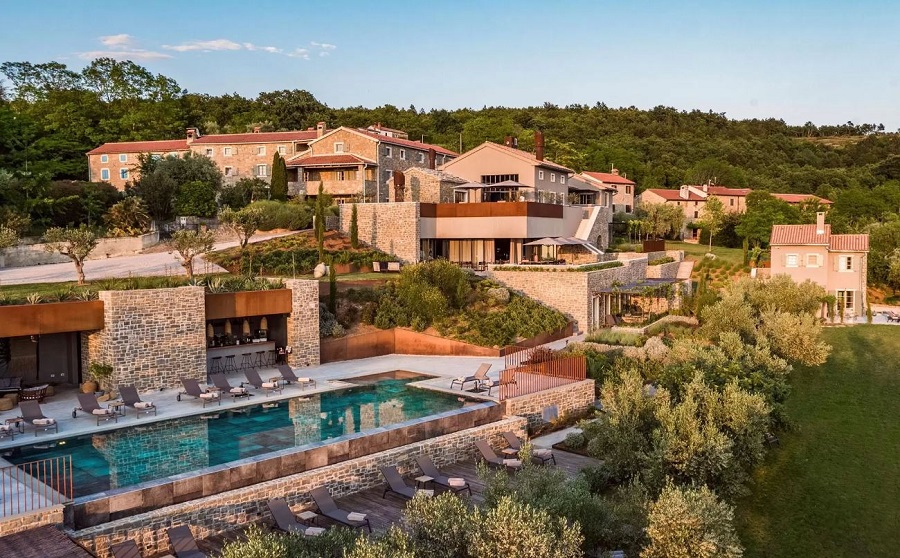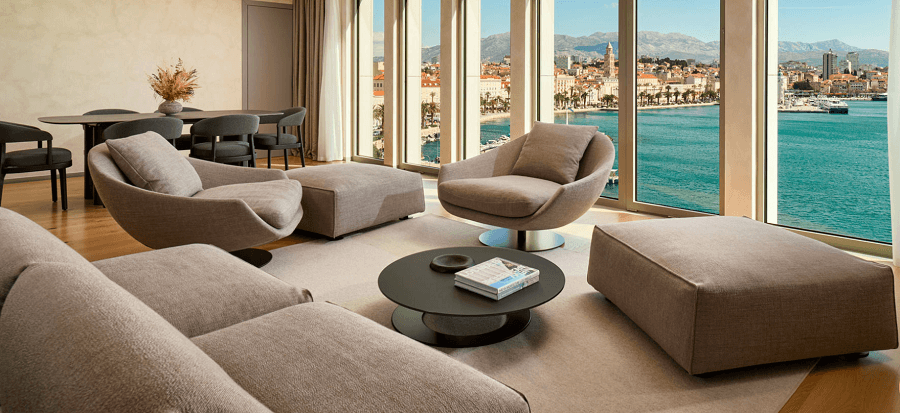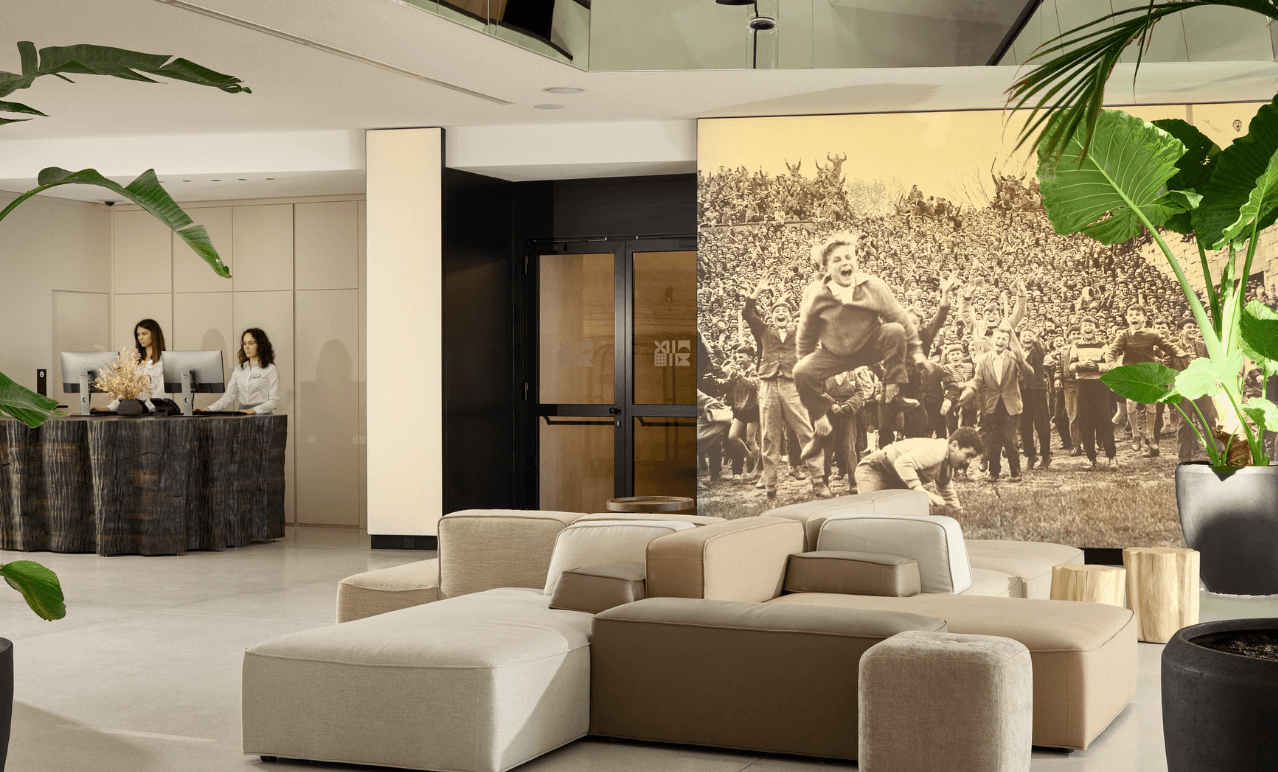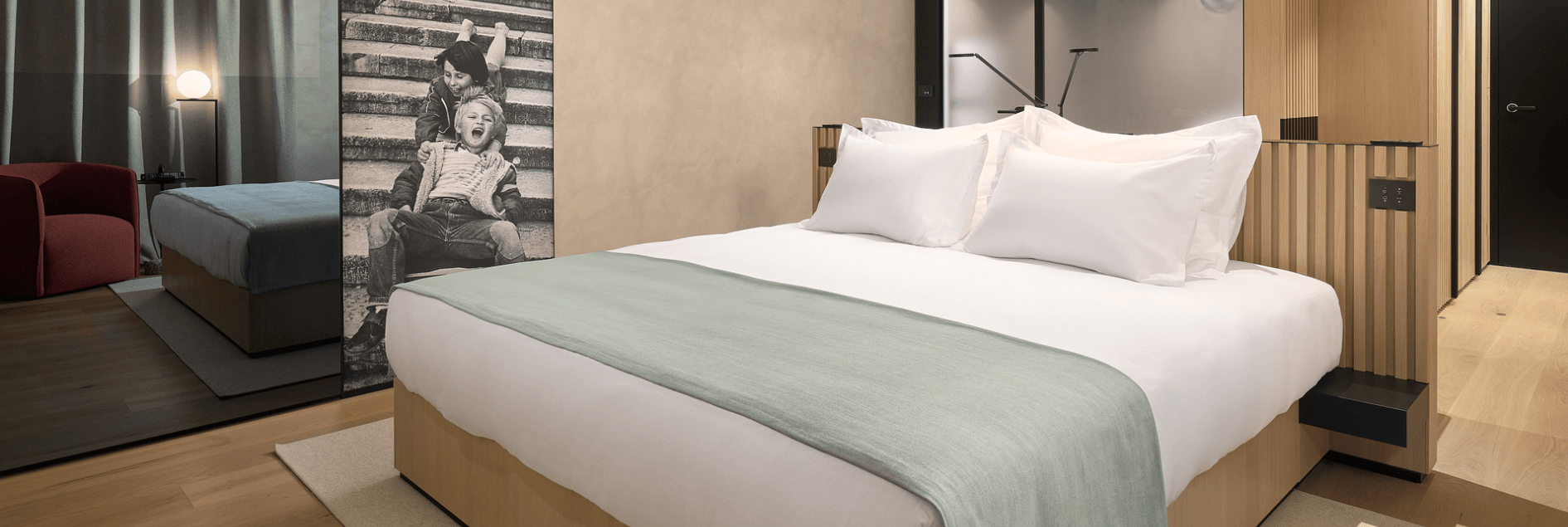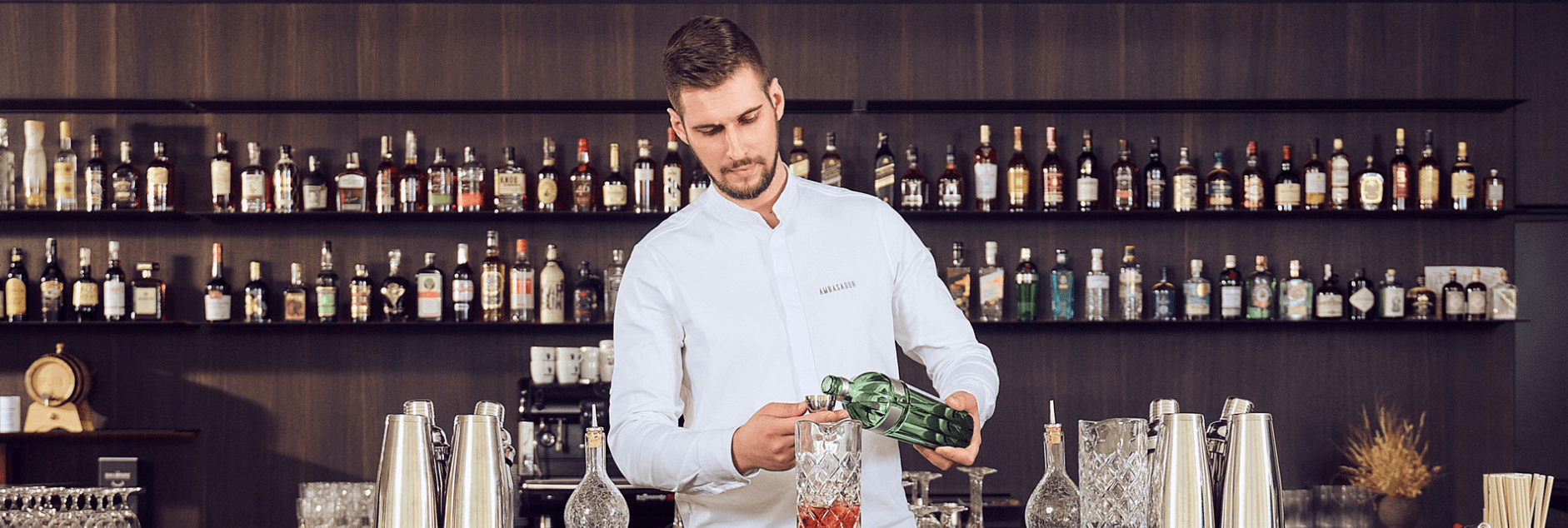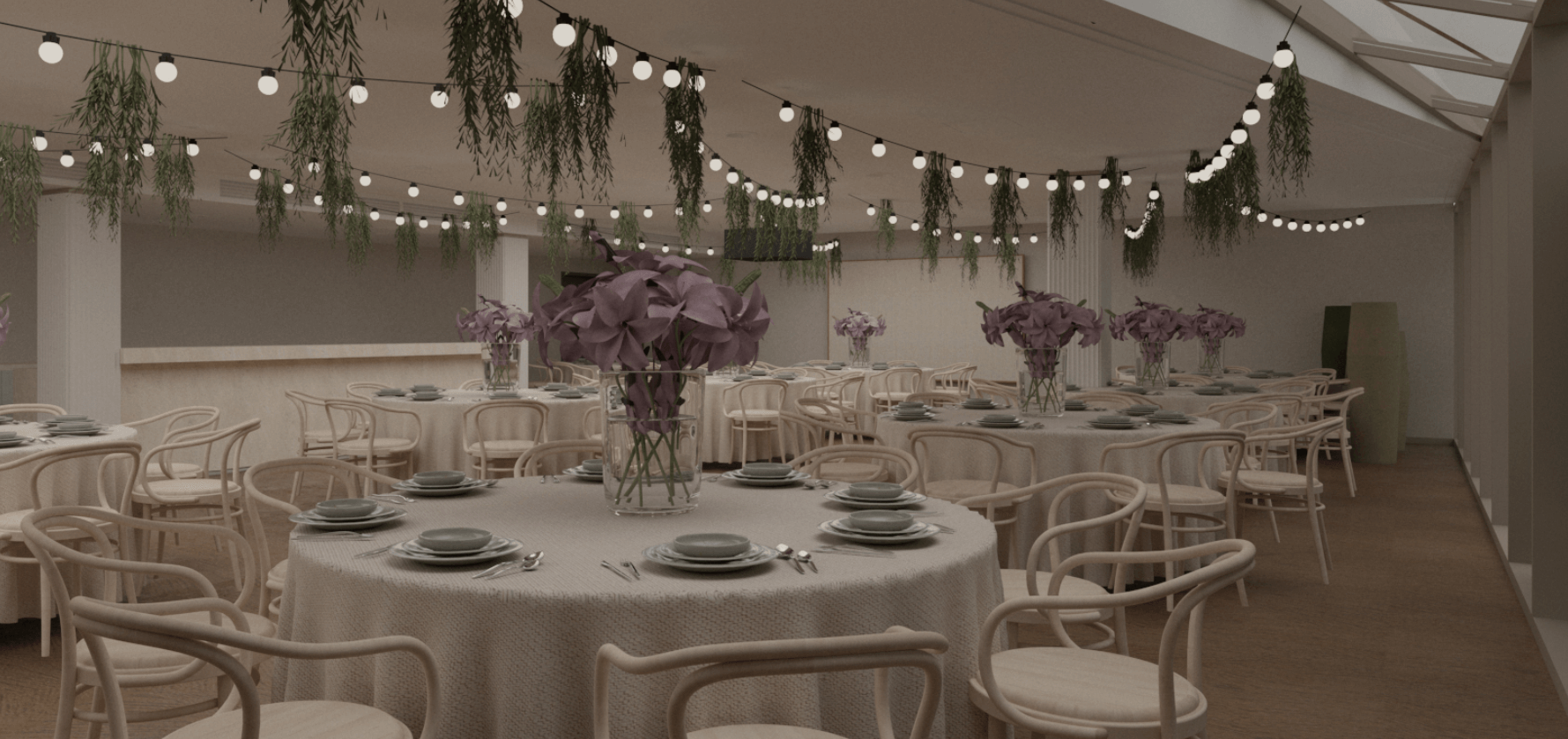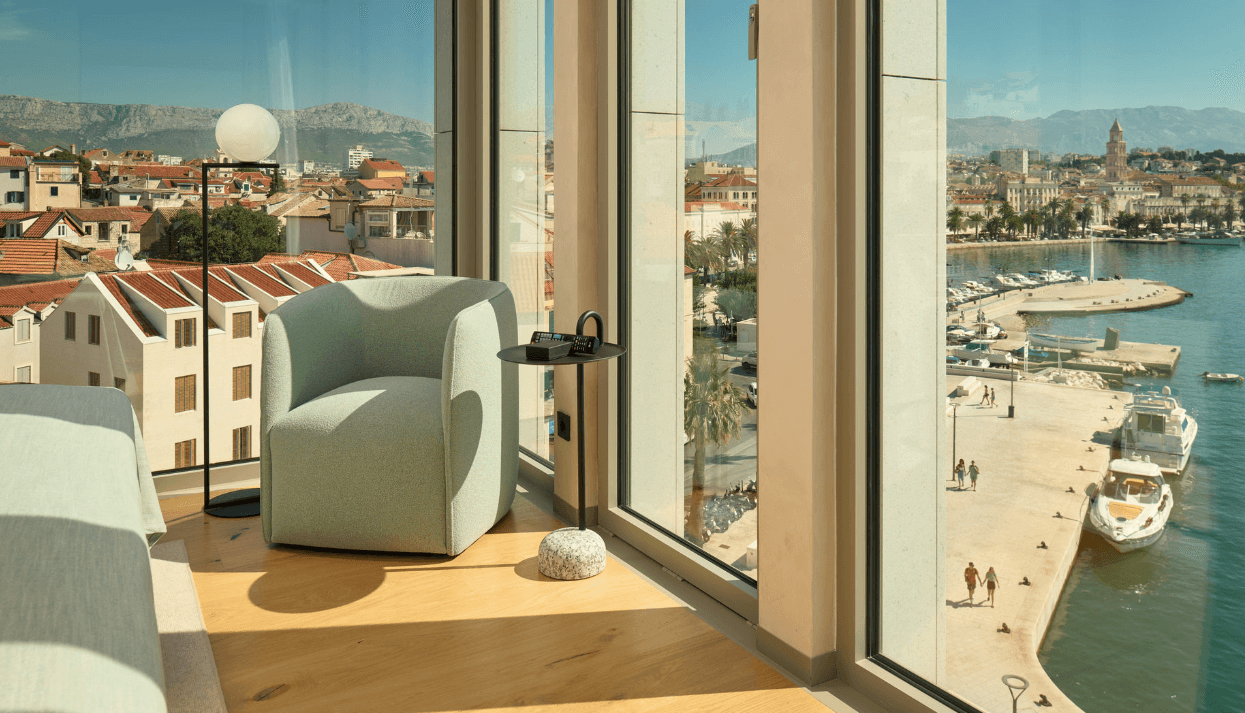Inland Istria, Croatian Tourism's Greatest Success Story
May 28, 2023 - As the world talks of sustainable tourism, a quiet revolution in the olive groves, vineyards, and forests of inland Istria is showing how it is done.
Back in 1998, in a forgotten tiny hillside village in northern Istria called Ipsi, close to the Slovenian border, local man Klaudio Ipsa made a decision which would start a revolution in tourism in the region. A decision people laughed at, declaring him crazy.
In this picturesque village of just 18 people, down from a previous 126 just a few years before, Ipsa decided to revive 100 olive trees, as well as plant another thousand and start producing high-quality extra virgin oil.
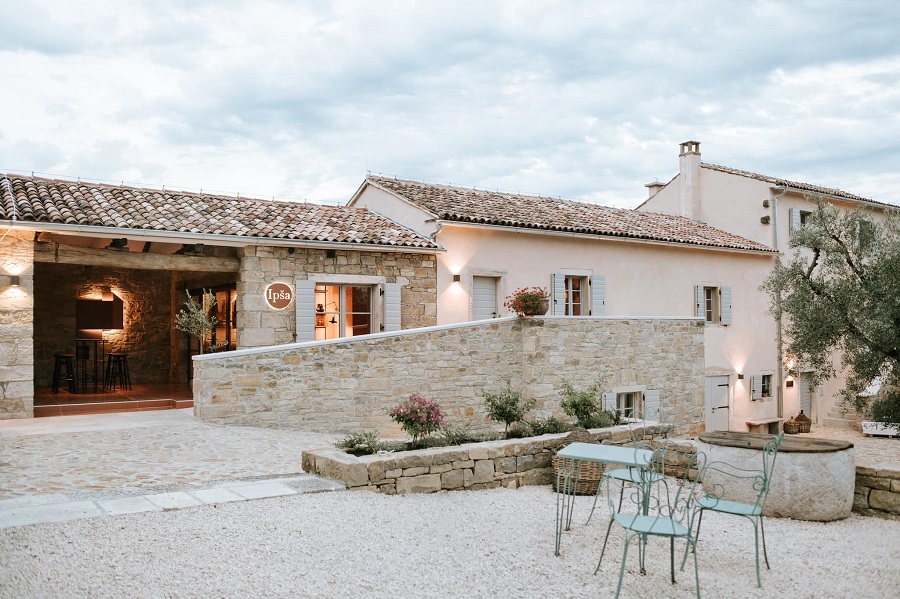
(Ipsa oil and wine in Ipsi, where the Istrian Flos Olei journey began)
Back then, inland Istria was not well-known for tourism, the focus more on mass tourism on its coast, and many of the villages inland were somewhat abandoned, or at least severely depopulated. While many locals produced their own olive oil, it was not a region known for its quality extra virgin olive oil at all.
Until a few years after the planting of those 1100 trees by Klaudio Ipsa.
Fast forward five years, and the first harvest in 2003. Fast forward another two years to 2005, and the Ipsa extra virgin olive oil became the first in Istria to be included in the illustrious Flos Olei Guide, akin to a Michelin Guide for olive oil, and a publication which traditionally fawned over the quality of olive oil from the likes of neighbouring Italy.
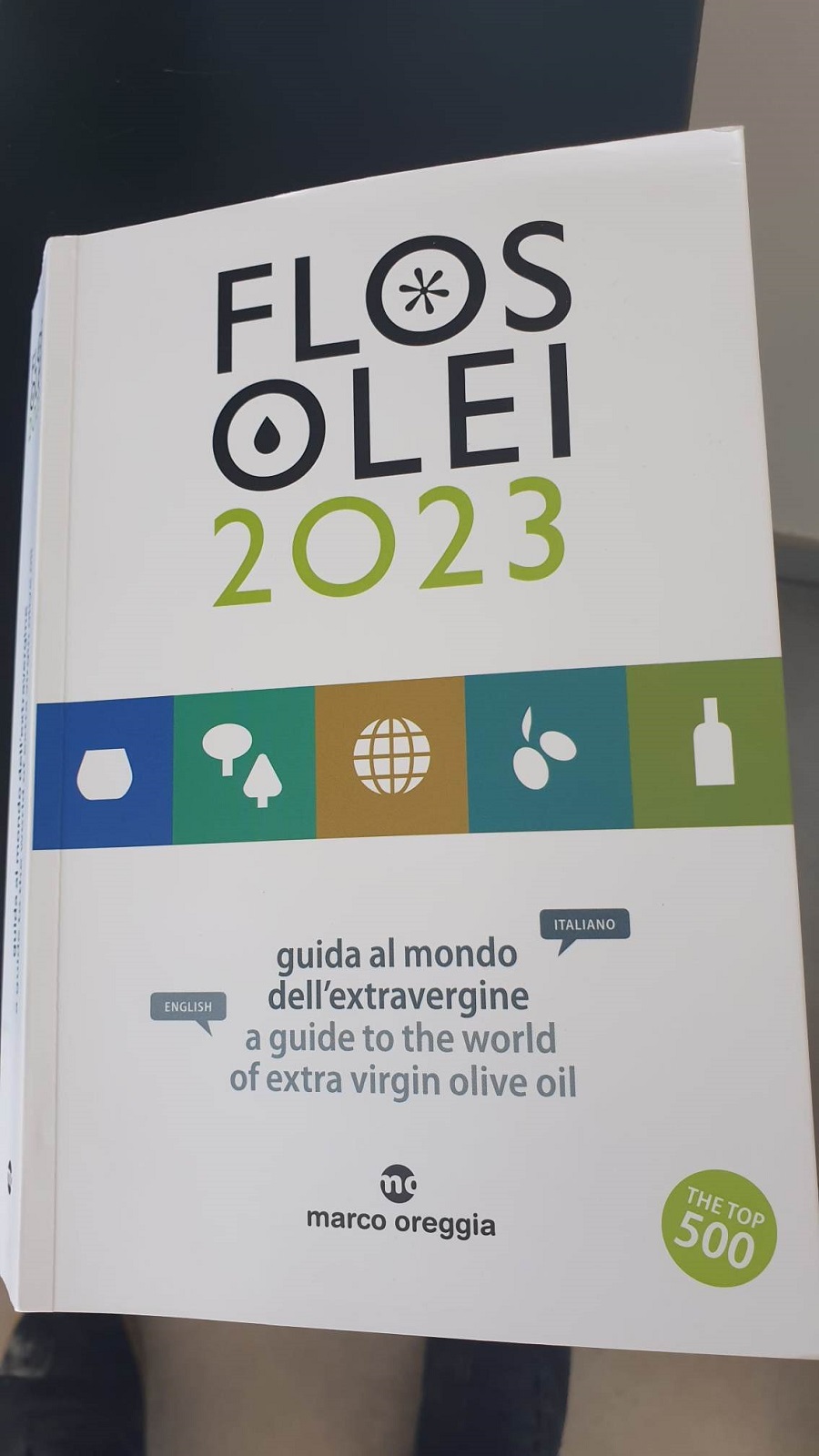
Other olive producers took note and - working with a team dedicated to raising the level of quality of Istrian quality in gastronomy - progress was swift. Only nine years after Ipsa's groundbreaking success, Istria was named as the best olive oil region in the world by the esteemed publication, with more than 10% of Istrian olive oil producers in the global top 500. An extraordinary achievement. In the latest, 2023 edition, there are 57 olive oil producers from Croatia in the world's top 500 - 56 of them from Istria, making up 11% of the global top 500. In third place is that man Klaudio Ipsa, with 98 points out of a hundred.
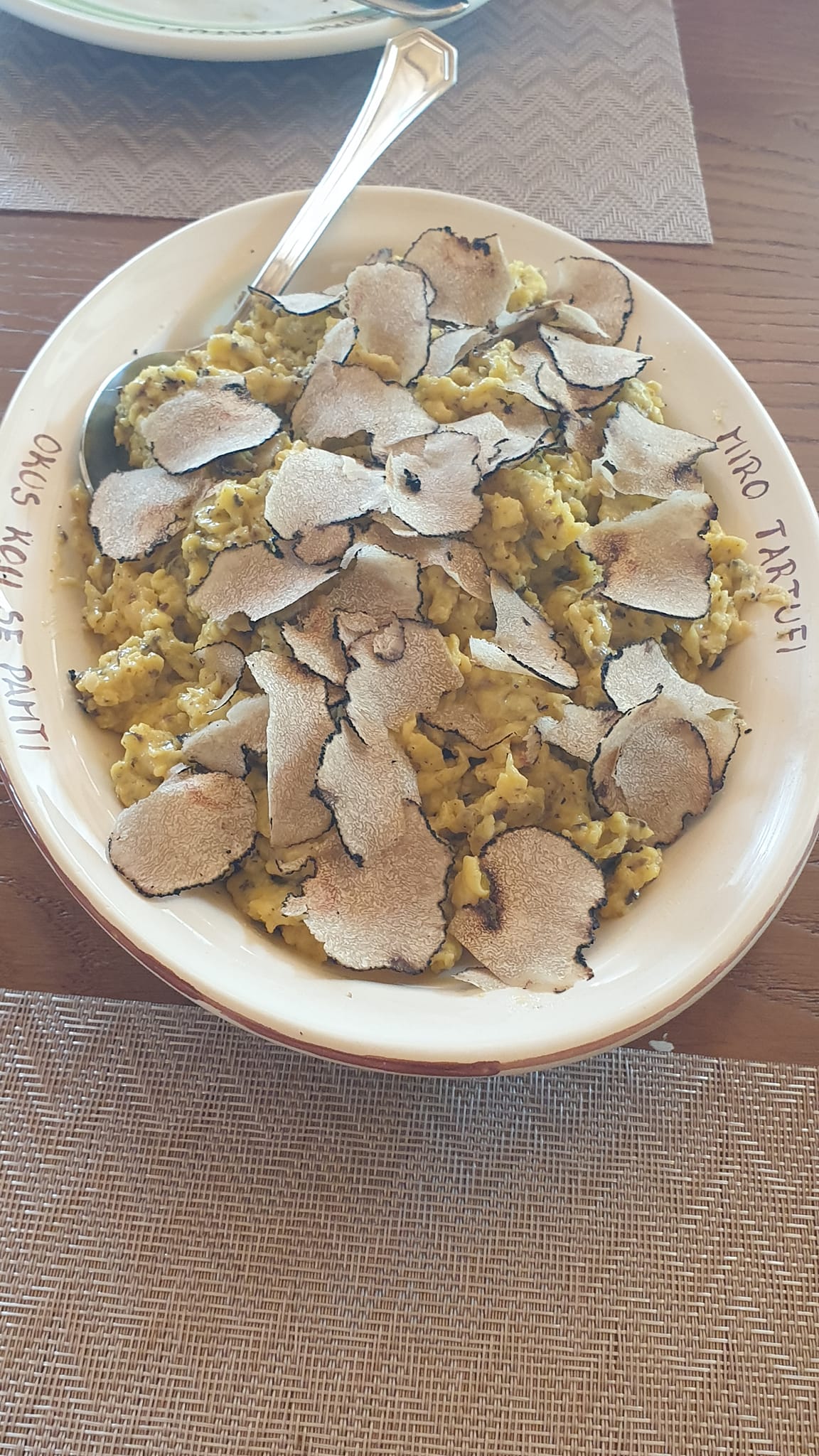
(Scrambled egg and fresh truffles from the morning hunt with Miro Tartufi in Motovun)
Meanwhile, down the hill in Livade, just below the picturesque town of Motovun, and just a year after Ipsa planted those trees, inland Istria was about to cause waves on the global gourmet scene after another local, Giancarlo Zigante, went out with his dog one morning.
His truffle-hunting dog, Diana.
Truffles were a part of the Istrian scene but it was not a region recognised internationally for its truffles. Until Giancarlo came home on November 2, 1999, with what the Guinness Book of Records described as the world's biggest truffle, weighing an astonishing 1.31 kg. Istria's arrival on the global truffle map was assured, and the region has worked hard to develop truffle tourism - it is now one of the most recognisable brands of Istrian cuisine.
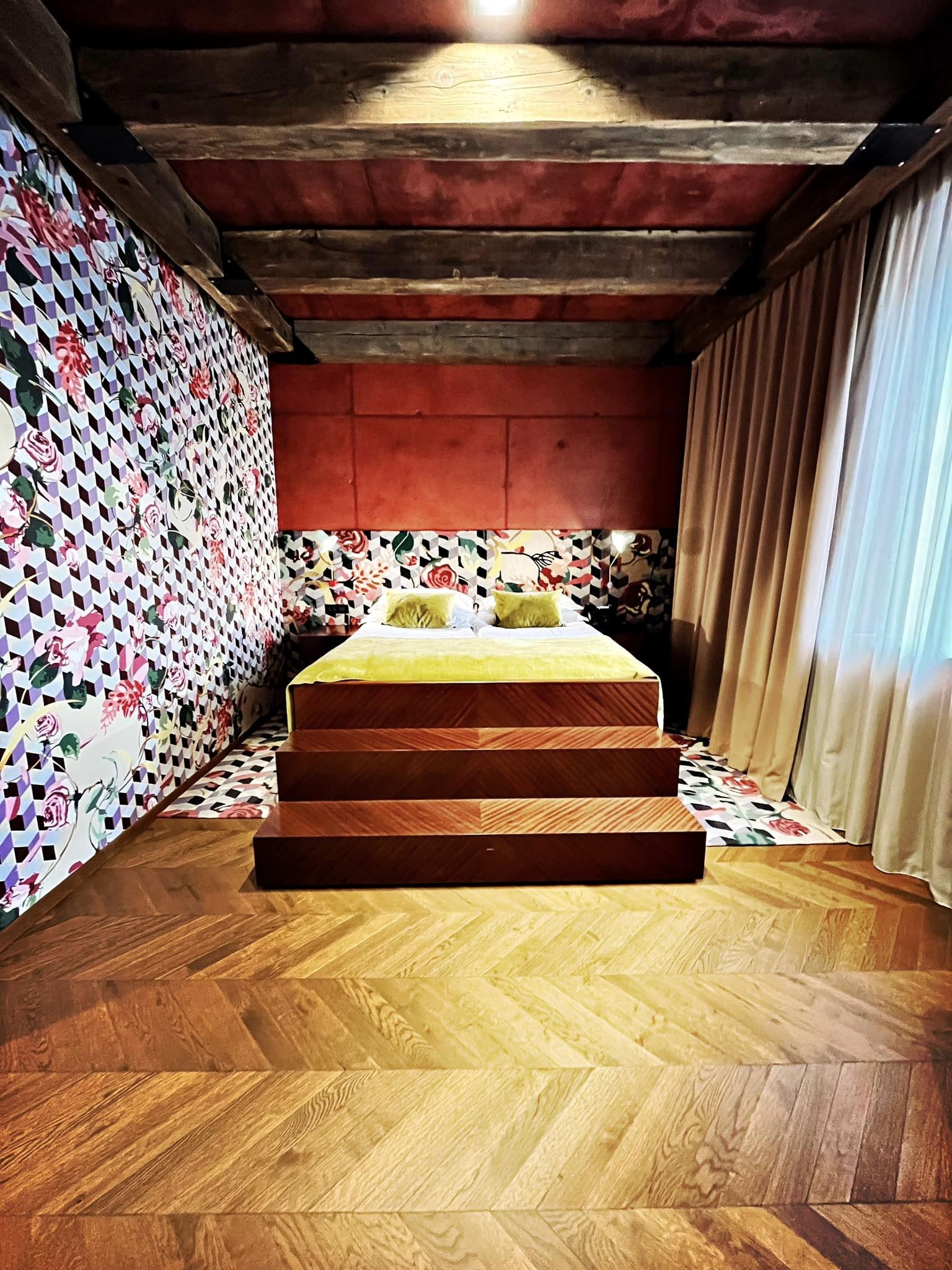
(Roxanich Design Hotel, Restaurant and Winery, a quality addition to truffle-hunting territory in Motovun)
Four years before the truffle discovery, and immediately after the Homeland War, the first luxury tourism tour of Croatia from the USA was conducted by Wanda Radetti in 1995. Istria had its historic charm back then, she told me over dinner at Hotel Ambasador in Split recently, but the wine was terrible. It was a choice of red or white, and very little of it was memorable.
About the same time - a year earlier in 1994 - Gianfranco Kozlovic, from a family wine-growing tradition dating back 200 years - decided that he wanted to focus on quality production. He was the first in Istria to introduce cold fermentation and the first harvests of commercial importance in 1994. Just three years later, at the Vinovita Fair in 1997, the Kozlovic Malvazija was named the best white wine in Croatia. The pioneer had delivered, others followed, and today the wines from the vineyards of inland Istria are much sought after.
Olive oil, wine, truffles - three of the cornerstones of Istrian tourism today, and all three a mark of quality and excellence, and yet all three hardly featured less than thirty years ago.
(San Canzian is one of the growing number of boutique hotels powering the luxury tourism revolution in inland Istria)
Full disclosure, I am an adopted Dalmatian
I have been to Istria many times on short trips over the last 20 years, but it is not a region I know as well as I should. Having bought a house and married on Hvar, I have Dalmatia in the blood - Paradise indeed. Perhaps it was through loyalty to Dalmatia, but for some reason I never really clicked with Istria, and I have been criticised over the years (rightly) for not featuring Istria enough on TCN. I decided to try and change all that and contacted the very proactive Istrian Tourist Board Director, Denis Ivosevic, to see if he was interested in helping me get to know his region a little better.
He was. Not only that, but Denis put together an excellent 6-day programme for us (more of which you can see shortly on my YouTube channel, Paul Bradbury Croatia Expert), most of which completely opened my eyes to what I genuinely think is the greatest achievement in Croatian tourism - the transformation of inland Istria into perhaps Croatia's top luxury and gourmet region. A claim that would have been laughable in the mid-1990s, when Denis and his team started their mission to transform the region into a quality tourism destination moving away from mass tourism and focusing on the quality of the local produce, its nature, and its cultural heritage.
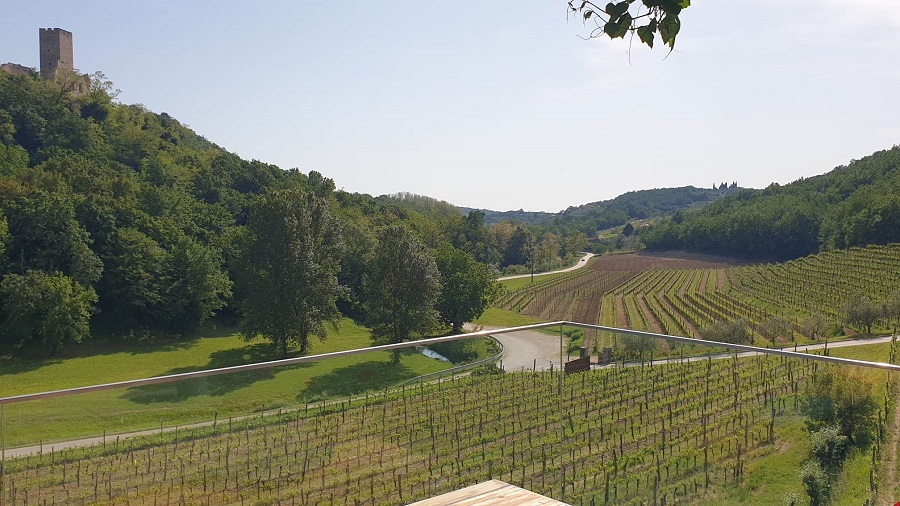
(One vision, one valley - Kozlovic)
I hadn't realised that Istrian tourism before the war was essentially mass tourism on the coast, and that many of the inland villages were completely dead. Driving through those picturesque rolling hills last week, past winery after winery, boutique hotels, thriving family farms, it is hard to imagine that it was apparently one of the poorer regions of Croatia before the war. Take away the quality wine, award-winning olive oil, record-breaking truffles, those luxury boutique hotels, and inland Istria must have been a different proposition.
Denis and his team worked hard to persuade local producers that Istria was too small to compete with quantity, and that its best chance was to focus on quality, quality, quality. He was there to encourage Ipsa to take those initial steps, as well as Kozlovic and all those who followed. By focusing on quality, education, and best practices elsewhere, slowly the project to transform inland Istria started to take shape.
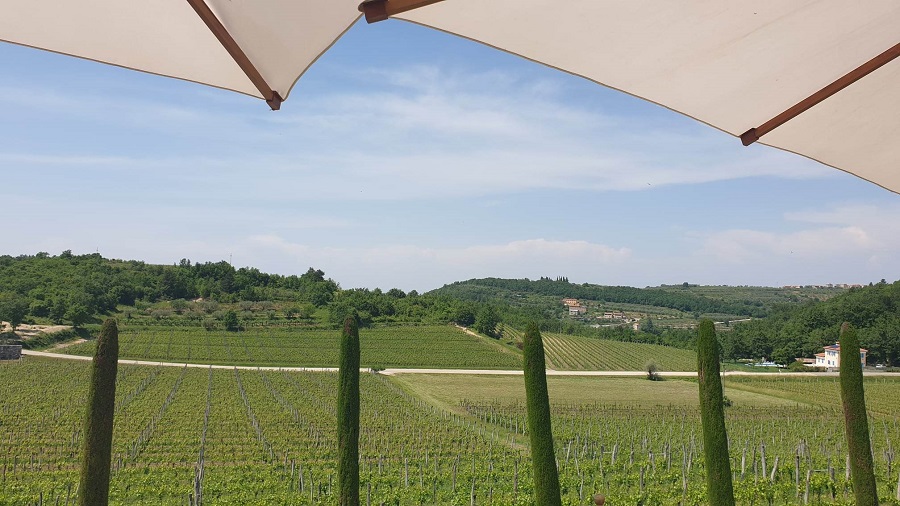
(One vision, one valley - Kabola)
I was not long into my Istrian journey last week before I realised one thing - inland Istria was a region of individual passion fitting into a collective strategy to really develop the region on so many levels. One family, one valley, one vision, I felt myself saying on more than one occasion. An individual project with few to no neighbours, a quality addition to the general picture. Individual gourmet excellence, all with a unique flavour and character.
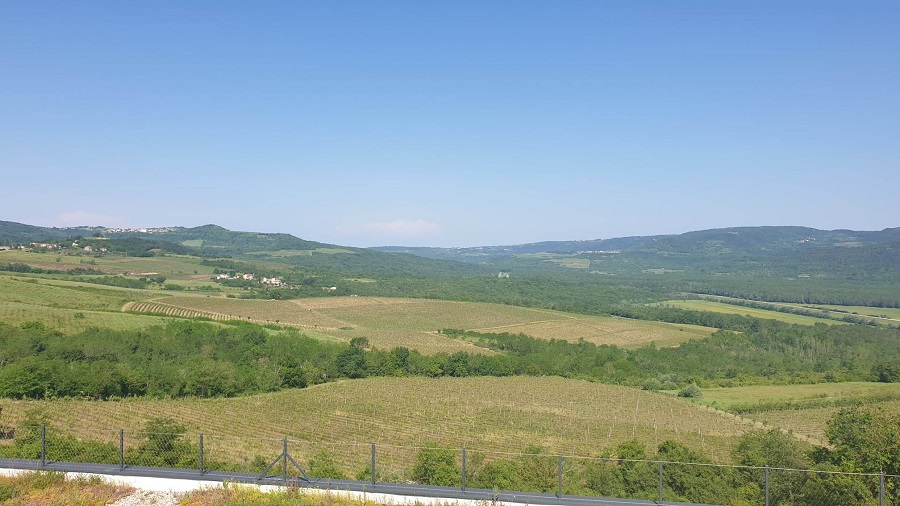
(One vision, one valley - Roxanich)
And for several places we visited, there seemed to be a pattern. It started out with making wine or oil, was followed by oil or wine, then a restaurant, then a place to stay. Education, education, education. Quality, quality, quality.
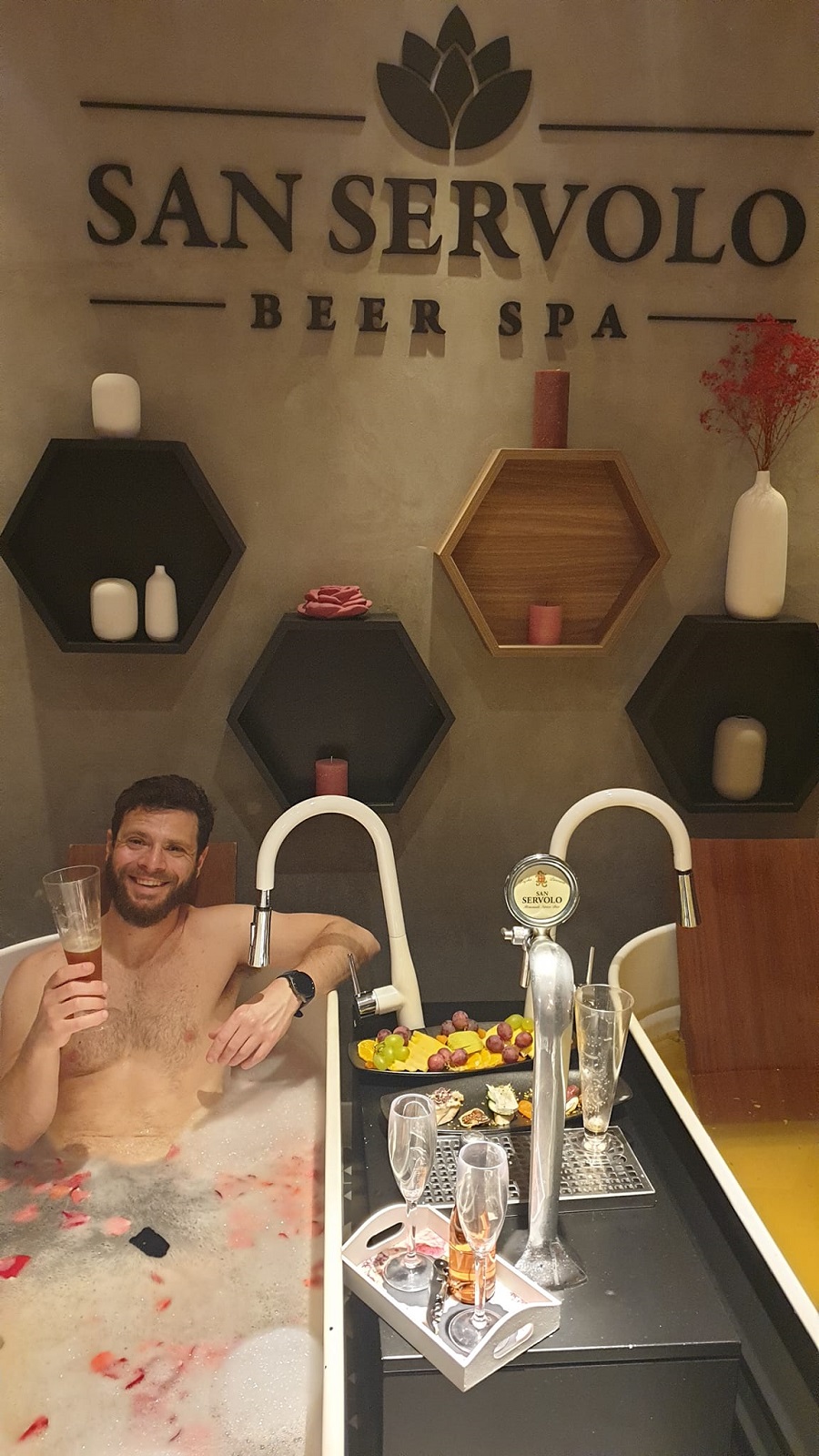
(The San Servolo beer spa for two - a beer bath for one, a rose petal for the other - with draught San Servolo on tap)
It was a wonderful week, where I spent much of the time admiring views of spectacular vistas, glass in hand, marvelling at the individual host of the moment. The incredible success of the San Servolo beer factory come restaurant, spa (and I DO recommend the beer spa), hotel, restaurant, mobile home complex, with a trattoria to come.
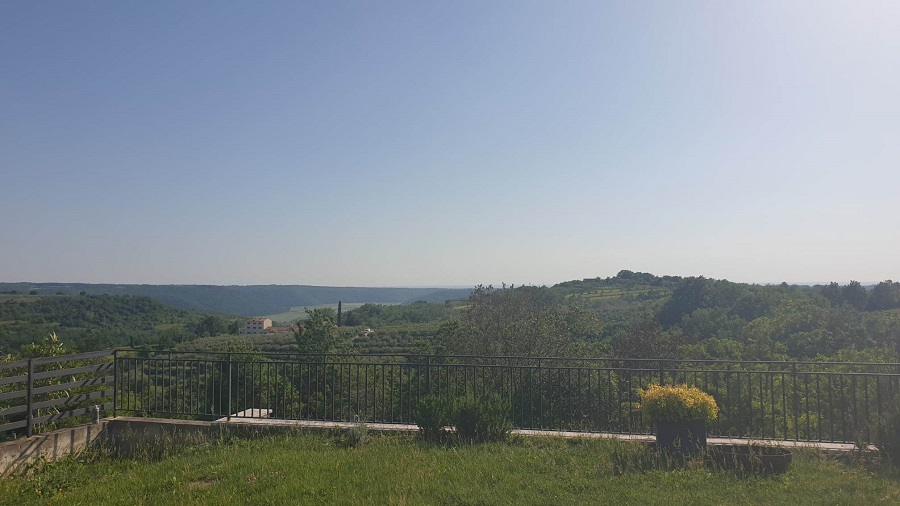
(One vision, one valley - Clai)
The fabulous wineries and views of Kabola and Kozlovic, followed by the magnificent Roxanich in Motovun. Boutique hotels such as Roxanich, San Rocco, and the discovery of the trip - Clai.
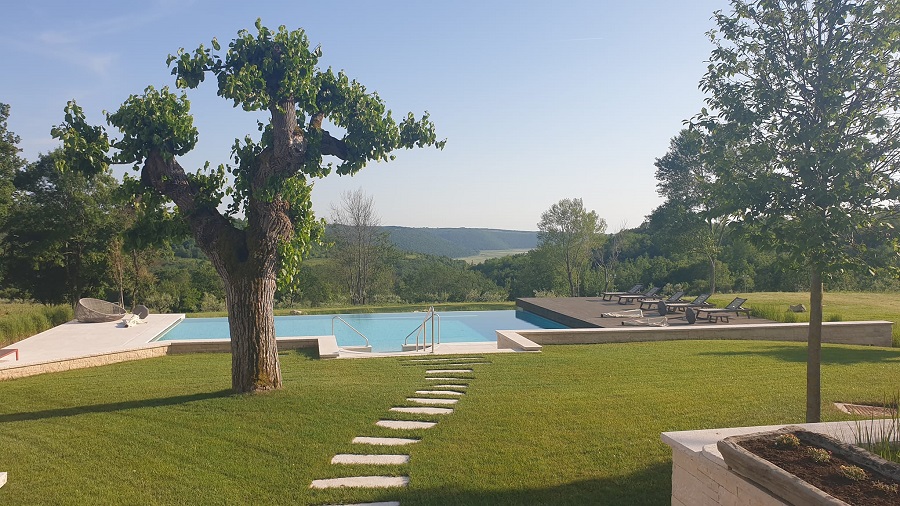
(The only property in the view from the Clai winery - Istria's most luxurious rental - a small part of the garden)
It started as a visit to yet another excellent winery, with its own stunning view over the valley. Another case of one vision, one valley. But then we were taken to see the rest of the project, which included the most expensive villa in Istria at 49,000 euro a week (sleeps 20), and a quite extraordinary dinner at a restaurant whose name did not seem that promising - Stara Skola, or Old School, in Krasica, which is being run by famous Swiss-Canadian chef, Priske Thuring.
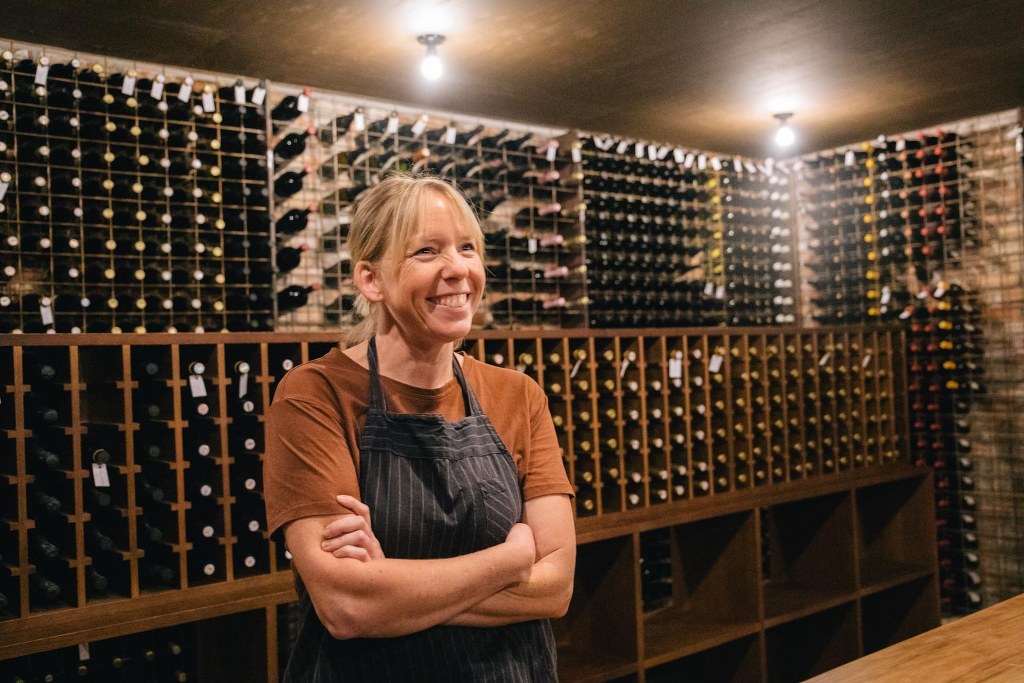
I will cover the food in a separate article - one of the best meals I have had in Croatia - but the story of Stara Skola in many ways symbolises the regeneration of inland Istria for me. The school itself closed down 33 years ago, a not atypical event in the rural parts of Croatia at the time (or since). Falling into disrepair, the school was bought as part of the Clai project, Thuring persuaded to come on board, and the school then reopened as a fine dining restaurant with a zero waste policy, meaning that Thuring's menus are VERY creative and changing daily. With a commitment to buying local, many of the former pupils are once more returning to school more than 30 years later - this time to deliver fresh produce from their gardens to the restaurant kitchen. The janitor all those years ago is once more working at the school, tending the garden and other chores.
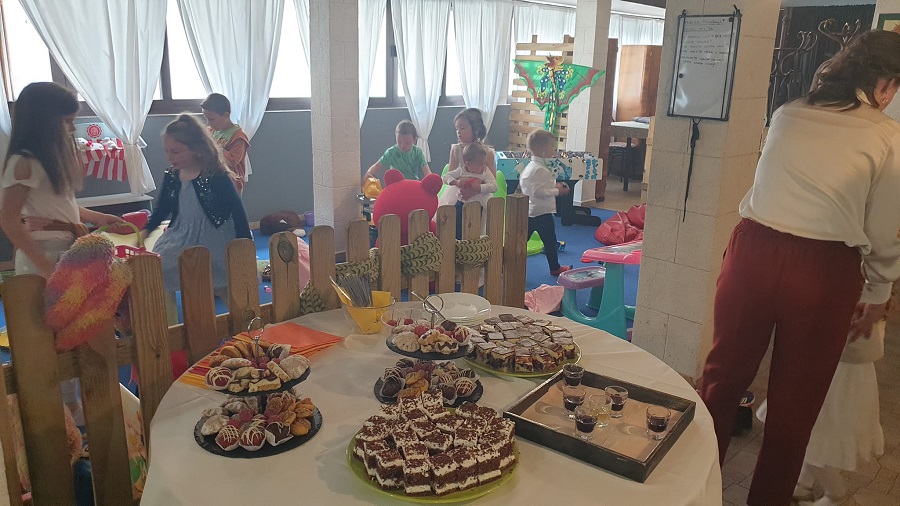
(Bursic in Vodnjan - a family prsut experience)
The quiet revolution of quality, celebrating local, and excellent service is spreading nicely all over inland Istria, and it is extending to other areas too. I have tasted a lot of prsut in my time here, but I have never been to a prsut tasting place as Bursic in Vodnjan, which has outstanding facilities in addition to the excellent prsut, such as a well-equipped kids' play area. And if you are looking for a fabulous and (I think) unique prust product, don't miss the pancetta chips.
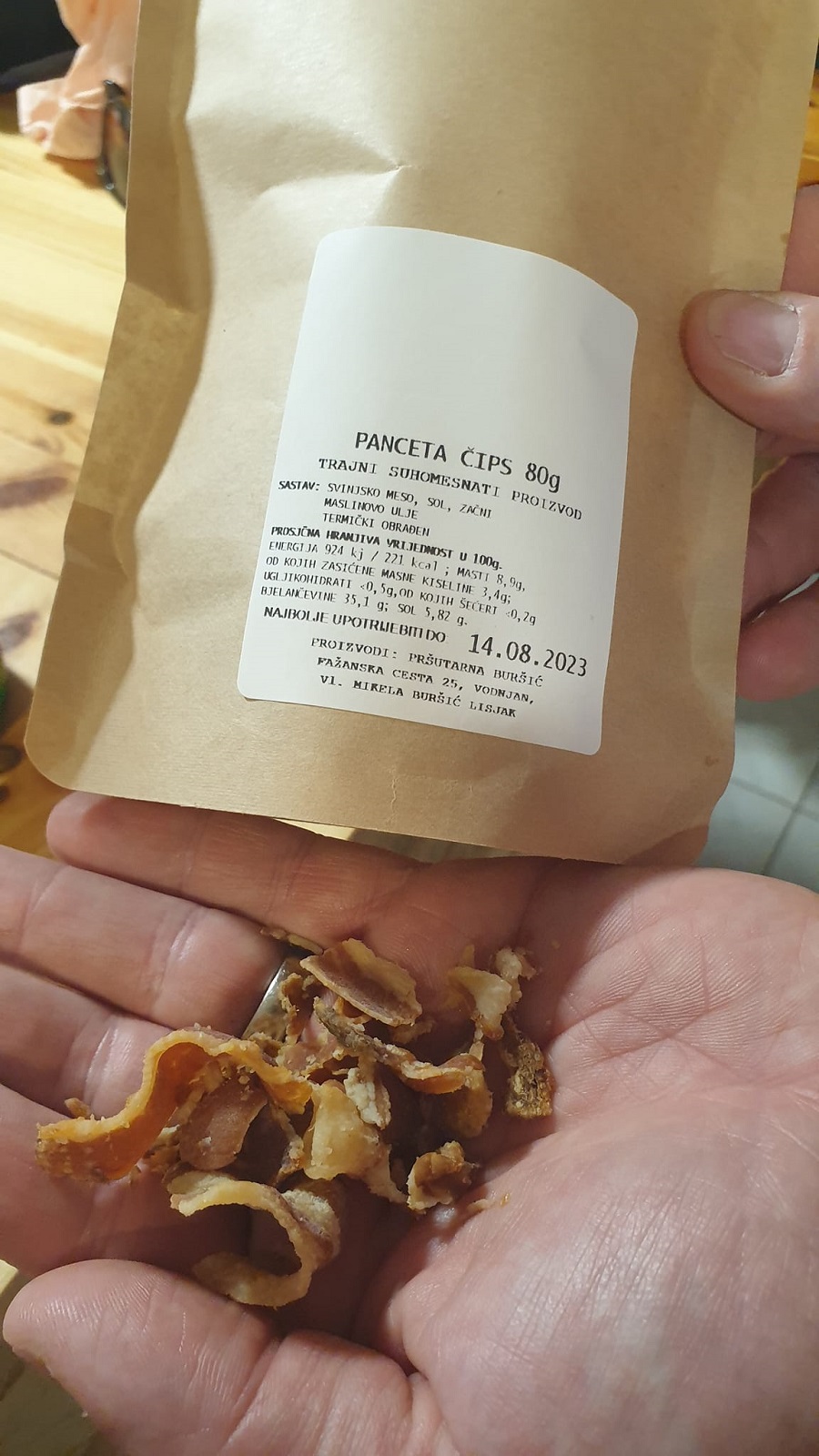
(Pancetta chips from Bursic in Vodnjan - just try them)
The hotels and restaurants are all buying local, helping small producers to develop their businesses, while also promoting them. It is a region that seems to be working in perfect harmony, developing an eco-system, which is increasingly interlinked. And all the hotels were full in May. Not only that, but guests were not rushing to the Adriatic, as one might expect, rather luxuriating in the nature, peace and quiet, as well as the traditions and culture of the hilltop towns around.
And then the statistic that truly blew my mind from Denis - and hark back to where inland Istria was in terms of development 30 years ago.
"The average room rate on the Istrian coast is 85 euro a night, and the average occupancy is 90 days.
"The average room rate in inland Istria is 290 euro a night, and the average occupancy is 120 days."
An incredible 3.5 times higher spend, and 33% longer stays. And all from a standing start compared to coastal tourism which is very well developed.
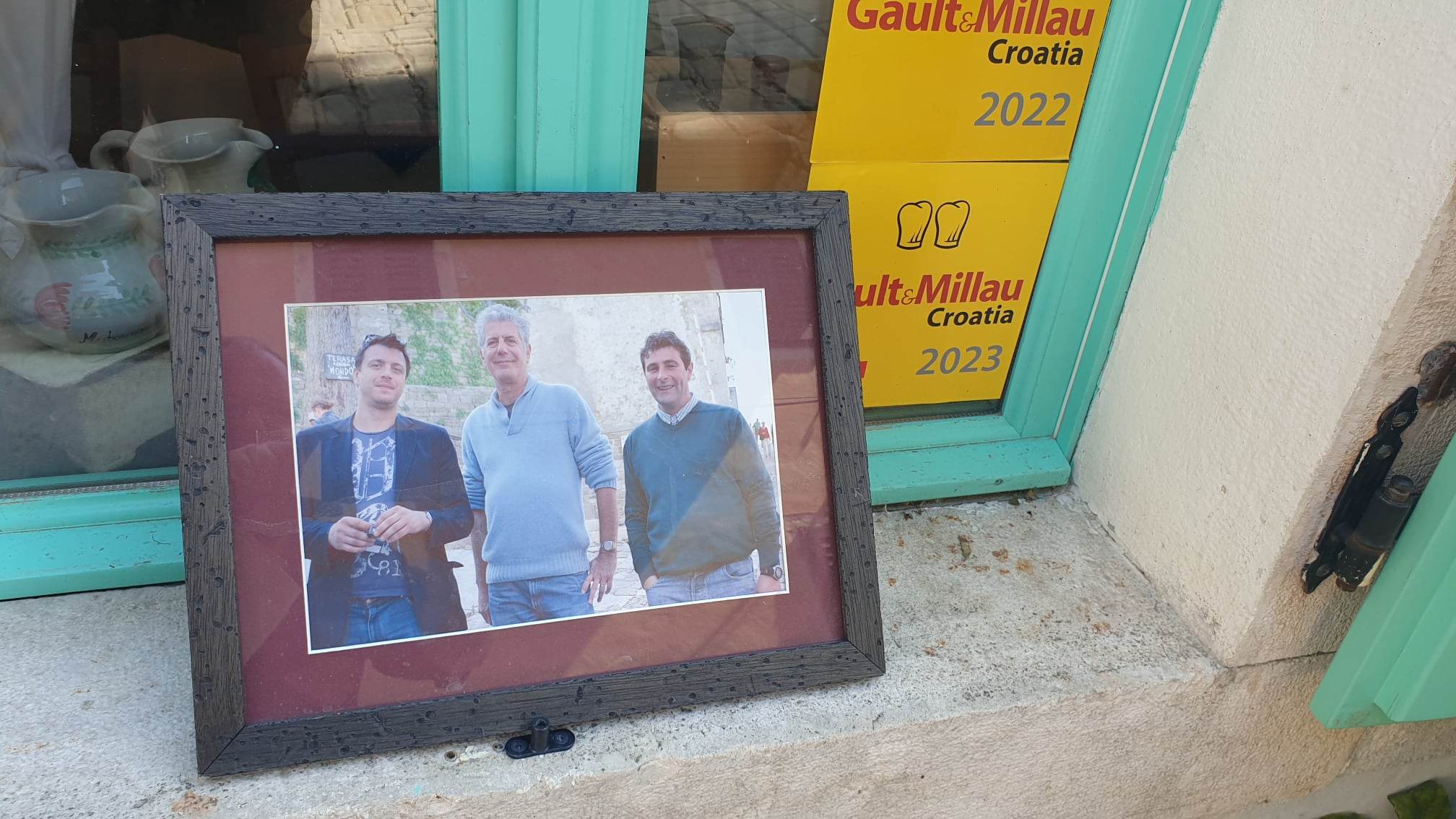
As I wandered through the delightful old town of Motovun, my guide pointed out a photo at a local restaurant of Anthony Bourdain, who had dined there on his famous No Reservations visit back in around 2011. It seemed somehow apt that he too had come to discover a region about which he knew nothing but left waxing lyrical.
Inland Istria is a phenomenal experience and a showcase example on how to work with what you have to develop a destination. An example of how a coordinated vision and the passion of individual visionaries working in tandem can produce stunning results.
As a Dalmatian boy, colour me impressed.
(Paul Bradbury visited inland Istria in May, 2023, as a guest of the Istrian Tourist Board.)
****
You can subscribe to the Paul Bradbury Croatia Expert YouTube channel here.
What is it like to live in Croatia? An expat for 20 years, you can follow my series, 20 Ways Croatia Changed Me in 20 Years, starting at the beginning - Business and Dalmatia.
Follow Paul Bradbury on LinkedIn.
Croatia, a Survival Kit for Foreigners is now available on Amazon in paperback and on Kindle.

23 Percent More French Tourists in Croatia in First Four Months of 2023
May the 23rd, 2023 - There has been a 23 percent increase in the number of French tourists in Croatia so far when compared to this time last year, and with flights from France to Croatia frequent until the end of October, it's likely that we'll come close to pre-pandemic 2019's results.
As Poslovni Dnevnik writes, over the first four months of this year, there have been 23 percent more tourist arrivals and 12 percent more overnight stays realised by French tourists compared to the same period last year, as reported bythe director of the Croatian Tourist Board's Representation in France, Daniela Mihalic Djurica.
"We believe that this year we will come close to the record results we saw back in 2019, when we achieved 640,000 arrivals of French tourists,'' said Mihalic Djurica at the end of the Morbihan Bay Week festival in the city of Vannes, located in the Brittany region.
This is the result of more favourable global health conditions, but above all promotional campaigns of Croatia as a desirable tourist destination here on the French market, she says.
"We're developing more and more through different products, and Croatian maritime heritage is only one of them, and that's why festivals like this one in Brittany are extremely important to us," she added, thanking the Cronaves association from Split for their help, which has been popularising and representing Croatian maritime heritage throughout Europe for a decade now.
Speaking about the campaigns and activities of the Croatian National Tourist Board's Representative Office over in France, she pointed out that in recent months the emphasis has been primarily on the representation of Croatian regions such as Zagreb, Kvarner, Istria and Slavonia, as well as on the wealth of the country's natural heritage and sustainable development.
"Campaigns with our strategic partners, as well as numerous PR and marketing activities, are ongoing. We used this week in Brittany to present the tourist offer of Kvarner with an emphasis placed on the island of Krk, Vodice and Split,'' she said, noting that there is no major part of France that is not connected to Croatia by at least one direct flight from April to the end of October. She estimates that France is a very potent market with 65 million people.
For more, make sure to check out our dedicated news section.
New Croatian Tourism Law to Encourage Sustainability
May 14, 2023 - A move away from quantity to quality in the new Croatian tourism law, reports Morski.hr?
-We are raising quality, we do not want mass tourism. We are expanding the offer, tourists are staying more, the number of overnight stays is increasing throughout the year. We will also invest in health tourism, Minister Brnjac points out.
- We had to make a real reform of Croatian tourism when the pandemic started, there are climate challenges, resources, we started working on a reform of several steps - adopting a strategy for developing year-round tourism, adopting a national plan for secured funds and the Tourism Act, the first umbrella law. It needs to organize the management of sustainable tourism - said Minister of Tourism and Sports Nikolina Brnjac in N1 Studio.
She added that the law primarily applies to mayors and prefects, they make decisions in communities, they must know what kind of tourism they want, they will have to make management plans every four years. Those with a tourism development index of 1 and 2 must submit capacity plans.
- Accounts of sustainable tourism will be made. Through management plans and capacity planning that will be clearly prescribed, the local population must be satisfied with resources, consumption of drinking water, electricity. Natural resources are not inexhaustible - she pointed out.
She emphasizes that sustainability, care for the environment and cultural history have become very important to tourists. Research shows that tourists' first questions are how we plan to change the rules of sustainability, whether we take care of resources. Today, tourists follow destinations, how they take care of their natural and cultural-historical heritage, writes N1.
They have been working on the law for a year and a half in silence with analytics, as it was solved with others, there is no single recipe for all destinations, Brnjac reveals.
- If you have a satisfied local community, then we will have satisfied tourists, they want to see preserved cultural sights, natural resources, they want to enjoy the outdoors. Local leaders will be able to define projects of special importance for the destination according to sustainability criteria - he says.
When asked how the numbers in tourism will grow in the future if the local community can limit the number of tourists depending on resources, Brnjac explained:
- We are raising quality, we don't want mass tourism. Over seven million overnight stays have already been achieved, which is better than in 2019. We are expanding the offer, tourists are staying more, the number of overnight stays is increasing throughout the year. We will also invest in health tourism. We are much more than sun and sea, we have a lot to offer - concluded the minister.
New Croatian Tourist Season Approaching, Old Problems Persisting
May the 9th, 2023 - A new Croatian tourist season is upon us, and with the height of the summer season rapidly approaching, old problems which have plagued the sector for a long time are more than likely set to cause the exact same issues.
As Poslovni Dnevnik writes, announcements and expectations for the dawn of yet another new Croatian tourist season are naturally (and traditionally) mostly revolving around record results. Based on the bookings and expressed agency interest, it's being assumed that this Croatian tourist season could surpass the figures seen back during the pre-pandemic year of 2019.
However, the focus on mass visitation and profit maximisation automatically excludes some other aspects of tourism planning. First of all, these relate to terms of ecology, transport and communal infrastructure, not to mention pressing social issues. All of that was still being talked about four years ago, but today it seems to have been more or less forgotten, writes Deutsche Welle (DW).
At the same time, we aren't talking about a shift taking place exclusively here in Croatia, nor are we only focusing on the tourism sector. A similar trend has also been recorded in agriculture, energy, transport, etc. The former specter of climate change and the damage being caused by pollution has fallen into the background, while the industry is now focused on another source of anxiety, the one concerning the loss of the market competitiveness of national economies.
However, in the case of Croatia and the upcoming Croatian tourist season, there's an undeniable link with ecology - if this country's manner of handling tourism continues to threaten the ecological basis and the sustainability of tourism, which today undoubtedly represents its main economic branch, it will be threatened.
"The post-pandemic recovery of tourism will certainly have its dark side in the form of renewed pressure on the environment and nature," Hrvoje Radovanovic, the head of the nature protection programme of Green Action/Zelena Akcija, stated. He believes that, although certain efforts are being made to "green" Croatian tourism up a little, among other things at the instigation of the tourists themselves who are becoming more and more environmentally conscious, one strategic problem persists: The main tendencies in planning the development of this sector are still primarily focused on attracting greater numbers of tourists, the extension of the season, and the tourism development of the parts of the country that tourists have mostly bypassed so far, etc.
Radovanovic pointed out that the infrastructure in many places across Croatia, especially those along the coast, is already unable to keep up with such a large number of tourists, as evidenced by last year's water supply problems in parts of Istria and elsewhere. "Thanks to climate change," he added, "it's to be expected that such situations will only increase in the future. A growing problem from the aspect of environmental protection is also the disposal of waste and wastewater produced by an increasing number of tourists, and there's also the destruction of the ecosystem thanks to concreting, apartment building and the construction of other tourist infrastructure".
Protected areas haven't been spared from this either, unfortunately.
"Even if it turns out that the planned measures and investments for ''greening tourism up'' represent something more than so-called greenwashing, and if they really do succeed in reducing the pressure on the environment, the total environmental pressure of this sector will continue to grow as long as the unlimited growth of the number of visitors and overnight stays remain the main goals of tourism development,'' believes Radovanovic.
Unfortunately, on top of all that, the controversial issues don't solely regard environmental and communal ones, but also those related to work in tourism itself.
According to estimates from the sector, this country is currently lacking about 60,000 workers to take up employment as waiters, chefs, bar staff and so on. Croatian employers, with the exception of the more stable ones such as larger hoteliers, still aren't offering their staff adequate salaries, meaning that they continally fail to retain employees who have worked for them back during previous Croatian tourist seasons.
It's already fairly well known that because of this, Croats have been emigrating to the northwest of the EU in large numbers for years now, while workers from Central and East Asia are being invited to come and work Croatia, and the deeply concerning part of the whole saga is that these individuals from third countries are more than ready to work (and work hard) for significantly lower wages. On top of that, the problem of their professional qualifications and the maintenance of service standards arises, all because of the crowning priority of the owners of tourist facilities - profit above all else.
"Croatia's ongoing labour shortage issue is particularly pronounced this year. While it's definitely not a new thing, it is a problem that has been growing and becoming more complex for a long time," Eduard Andric, president of the Croatian Tourism Union, emphasised to DW. He also participated in the working group of the sectoral ministry for the creation of the National Strategy for the Development of Sustainable Tourism until 2030, when it was assumed that Croatia would try targetting guests with higher purchasing power instead of simply wanting huge numbers of people arriving.
Andric maintains that Croatian employers simply have to understand that they need to give up part of their profits in favour of employees' salaries, or they will simply be left without anyone to work for them and without any earnings whatsoever.
For more, make sure to check out our dedicated news section.
British Couple Mark and Gilly Start Medjimurje Glamping Business
May the 6th, 2023 - British couple Mark and Gilly decided to swap Northern Europe for Strigova in Medjimurje, where life is less expensive and the peace and quiet also offered in the British countryside can be enjoyed for much less. They have also started their Medjimurje glamping business, and it's going very well.
As Poslovni Dnevnik writes, we're more than often flooded by depressing headlines and stories about Croats abandoning their homeland and heading off abroad in search of a better life and more economic stability, but the opposite story is also being more and more frequently told. A British couple have decided to move to Strigova and start their Medjimurje glamping (luxury camping) business. They're far from regreful about their move.
Due to the nature of their work, Mark and Gilly have already travelled the world, but they said they knew they would one day settle somewhere in Europe, but not necessarily the UK. The final decision ended up being the Republic of Croatia.
"I noticed the vineyards, somewhere around Novi Marof, I think. I thought, this would be an interesting place to live," said Mark.
"It seemed like a very nice place, people take care of their properties nicely, it's very peaceful. We thought this was the perfect place to live," added his wife Gilly Whitefield.
Mark and Gilly have lived in Strigova for three years now, and last year they started their Medjimurje glamping business, which has been going very well for them indeed.
"We have two tents, and this year we will have four. Business is going very well," explained Gilly proudly.
"From our perspective, we wanted to live in a place with a more pleasant climate. We knew it was unlikely that we would return to the United Kingdom, it has become very expensive to live there. In addition, we like the peace and quiet, Croatian culture and the fact that Croats are more connected to nature, working on the land, growing their own food. I mean, that's a nice part of living here," says Mark.
Starting a business in Croatia isn't easy, but this couple had all possible support on offer to them during the often daunting task of getting started, let alone running the business.
"We had excellent cooperation with the local mayor. He was exceptionally supportive, as were all of the other local authorities, the county and the city of Cakovec, urban planning, and tourism. In addition to all of that, we've only had good experiences with the local craftsmen," pointed out Mark.
They visit local manifestations and events, socialise with local people and both agree that the move has been very good for them. Their neighbours, just by a sheer stroke of good luck, are also a couple who chose to relocate to gorgeous Medjimurje from Britain.
For more, make sure to check out our dedicated news section.
Croatian Tourism to Face Major Problems Lacking Qualified Workers
May 2, 2023 - These days, Opatija is full of cheerful and smiling people eager to have a good time and receive quality service, and this is expected for the whole season, Milan Sesar, owner of the Mali Raj Hotel at the junction of Ičići and Opatija, said in Dnevnik N1. However, he warned that the Croatian tourism sector will face one major obstacle.
"I'm afraid we will have a big problem. Our fridges are full of goods - from fish, meat and other foods, but I am afraid that there is no one to serve and prepare them, that is, a certain number of people will not receive adequate service. This is the biggest problem in our profession - workers are leaving us, and new ones are not coming. People who come to work with us are total beginners who have never worked in this profession. Then by the time they are trained, they leave again", said Sesar, emphasizing that the whole society must be concerned about the workforce, especially in tourism, as reported by Poslovni.
"Working in tourism is not easy. You need to speak foreign languages, be able to approach guests, be a good salesperson, and that cannot be someone who arrived yesterday from the street. I'm afraid that this will be our biggest problem this summer - that we won't have anyone to serve, sell, take the euros that the guests are ready to spend", believes Milan.
As the solution to this problem, he sees two different ways: "One would be to pay these people well, and the other for the entire community to find a formula on how to invest and convince young people to stay here and not move away so that they can have a quality existence and be happy with their work."
When asked how much the waiters earn in his hotel, he replied that these are internal matters and added:
"My waiter would earn the same as in Italy, if not more. My staff have been working for 25, 30 years each, which is a sign that they are adequately compensated because otherwise, they would not have stayed so long."
He also said that he personally has no problem with the workforce because their workers have the same salary throughout the year. "When a man knows that he will get an equally good salary and that it is safe, then he will not even think of moving on," he said.
For more, make sure to check out our dedicated News section.
Zagreb Tourism Overnight Stay Figure Beats That of Pre-Pandemic 2019
April the 20th, 2023 - The Zagreb tourism picture is looking brighter and brighter, and the number of overnight stays has now surpassed the numbers recorded this time last year back in the pre-pandemic year of 2019.
As Poslovni Dnevnik/Marija Crnjak writes, the Zagreb tourism sector can now officially say that the crisis caused by the coronavirus pandemic has finally well and truly passed, at least in terms of the physical traffic of tourists here in the capital. Visitors to Zagreb have now officially realised one percent more overnight stays than they did back during the same period of 2019.
This, of course, also includes the busy Easter weekend, which fell later on that year, more precisely on April the 21st, but this encouraging result has been realised despite the fact that guests from distant markets, primarily from Asia, haven't yet returned in full, while the return of Americans is more rapid.
In view of the return of guests from across the pond in the USA, as well as the growing renewed interest of guests from South Korea and other Asian countries, the Tourist Board of the City of Zagreb has started a new promotional campaign in cooperation with Turkish Airlines.
As such, by using the strong communication network of Turkish Airlines, as a strategic partner of the Tourist Board of the City of Zagreb, the recognition of the Croatian capital as an attractive tourist destination is significantly increased. Activities as part of the campaign are being carried out throughout April on all digital channels of this multiple award-winning airline with the aim of their mutual promotion in the aforementioned markets.
"We're satisfied with the results so far, which once again show that we've succeeded in positioning Zagreb as an attractive year-round destination. The American market is extremely important for Zagreb, and I'm pleased that, in cooperation with the Association of North American Tour Operators (USTOA), as well as with Virtuos, the leading network of the best American travel agencies specializing in luxury and leisure travel, we've also launched a campaign with Turkish Airlines. Within the Zagreb Tourist Board, we carry out a series of activities in accordance with our strategic plans, and with campaigns like this one, which is a great example of cooperation between a destination and an airline, we strive to improve the positive Zagreb tourism trends with a focus on the long-term and sustainable success of Zagreb as a tourist destination," stated Martina Bienenfeld, the tourist board director.
According to e-Visitor data, from the beginning of the year to mid-April, Zagreb tourism saw the highest number of arrivals and overnight stays in all of Croatia, i.e. 29 percent more arrivals than last year and 19 percent more overnight stays compared to the same period last year. Among foreign guests, the most overnight stays were realised by guests from Italy, followed by those from Germany, the USA, Bosnia and Herzegovina, and Serbia. Compared to 2019, the blossoming Zagreb tourism picture stands at 92 percent in terms of arrivals and has experienced an increase of 1 percent in terms of overnight stays.
As has since been learned from the Zagreb Tourist Board, since the beginning of the year, American guests have been the fifth most numerous tourists to visit Zagreb in terms of arrivals and the third in terms of overnight stays. Since the beginning of the year, Asia has also broken through to 10th place in terms of arrivals (5,111 arrivals), and they are not among the top 10 in terms of overnight stays either.
Korean nationals realised 1,231 arrivals in the city in April alone and are in 9th place among all foreign guests in the results for this month so far, so their return is noticeable. Before the coronavirus pandemic, more than 400,000 tourists from South Korea came to Croatia in 2019, realising more than 511,000 overnight stays.
For the City of Zagreb, guests from South Korea came second in the overall number of foreign guests. It's also worth noting that the capital is entering the 2023 season with the same number of beds in private accommodation than before the pandemic (and the earthquake), there are 9 percent more beds in hotels, and only the number of beds in hostels has fallen by 25 percent, from about 2,400 beds to about 1,800.
In 2023, 60 percent of the total overnight stays within the Zagreb tourism picture so far have been realised in hotels, 32 percent in apartments and only 7 percent in hostels.
IQM Destination, First Croatian Tourism Franchise Attracts Global Interest
April 19, 2023 - Croatia received the first franchise directly related to the tourism sector - the consulting company for the development of quality in tourism Feel IQM d.o.o. with the IQM Destination project, has developed a tourist destination management franchise that is already attracting significant interest from many tourist countries, including Brazil and Saudi Arabia.
As Poslovni writes, the franchise was developed in cooperation with the Čolak Franchise Consulting Group, from which they say that this project will not only set new standards in tourism but also contribute to the promotion of Croatia as a tourist destination.
The IQM Destination project was started four years ago by Đurđica Šimičić with her rich experience in the Tourist Board of the town of Mali Lošinj, and her team was joined by private accommodation consultant Anamarija Cicarelli and hotel sector consultant Pero Matić, and together with a team of external experts, they provide services of integrated destination quality management.
In short, their task is to connect all stakeholders in the destinations and focus them, come up with a plan to develop the destination, and enable things not to remain only in documents but to implement all those strategies and master plans. This task, it turned out, is often the weakest link in developing destinations.
Overcoming obstacles
"Each of the stakeholders in tourism has their own goals and tasks, but they are often not connected with destination positioning and more decisive joint action, encouragement of excellence and connection is needed. Although this is often expected from tourist boards, they have neither the budgets nor the resources to implement such a thing, which I experienced myself in the TZ of Mali Lošinj, where we tried to implement significant projects, but in our activities, we encountered just such limitations.
We provide destinations with very effective tools for measuring and managing the destination, as well as monitoring and introducing concrete measures with which they will design and implement their ideas", says Đurđica Šimičić, who we found at the project in the town of Jastrebarsko. It is just one of several destinations that have recognized IQM Destination as a partner for developing tourism.
They work on the continent and at sea; their list of references includes Split, Šibenik, Rovinj, Lošinj, Vodice, Karlovac, Pelješac, Novalja, Vukovar, Rab, Bjelovar-Bilogora County and several other Croatian destinations, which will remain the focus of the team in Croatia, while destinations abroad will be taken care of by their franchisors.
And they will get everything - from education to support at every step. Although each destination is dealt with individually according to the needs, circumstances, and products to be developed, the franchise could be set up thanks to the carefully designed system of tools and measurements used by IQM Destination and according to the recommendations of the World Tourism Federation.
Concrete measures
The goals of the project are to increase the quality of service; education adapted to the needs of tourism workers and all entities, positioning and branding of the destination, and responsible and sustainable tourism. All this is introduced with a series of concrete measurements and research.
The IQM Destination team measures residents' satisfaction with tourism in the destination, and guests' satisfaction with tourism in the destination, manages online reputation, then measures the satisfaction of stakeholders (tourism professionals), and everything is compared with local self-government plans in projects important for tourism.
120 indicators of sustainable and responsible tourism are "measured" during the process for each destination
Everyone is involved in the project, from the accommodation and catering establishments to wellness centers, travel agencies, shops and souvenir shops, taxi operators, and companies that manage the parking lot, utilities, and attractions.
Then destination standards are set, which are related to quality, local products, tradition, quality, and trends in tourism. They also prepare marketing analyses of individual stakeholders in the destination for clients, work on product development, private accommodation education, and hotel industry trends.
As Šimičić, a member of the UNWTO expert group for sustainable development, explains, in each destination in the advanced phase of the project, it is proposed to measure the indicators of sustainable and responsible tourism, with the measurement of more than 120 indicators, according to the instructions of the World Tourism Federation.
For more, make sure to check out our dedicated News section.
New for Croatia 2023: 1. Inside 5-Star Hotel Ambasador in Split
April 18, 2023 - A new tourist season is upon us, and there are a number of quality additions to the Croatian tourism offer. In a new series on TCN, we take a look, starting with the new star of the Split waterfront, Hotel Ambasador.
The social media posts are increasing in number. A new hotel, a new restaurant, a new tour operator offering something truly unique. The 2023 season is expected to be epic in Croatia, and with several quality new offerings emerging, there should be a little bit of extra choice this year.
So what and where are these new quality additions. In the first of a new TCN, we take a closer look at some of those new businesses which have opened their doors and are awaiting their first full season.
And where better to start than the finest addition to the Split waterfront in many a year - the new 5-star Hotel Ambasador Split with the 7-star location and view?
When I first moved to Croatia back in 2003, Split was known as the Gateway to the Dalmatian Islands. Visitors rarely stopped in the city, using more as a transit point for the charms of Brac, Hvar, Vis and Solta. But then Split started to emerge as a serious destination in its own right and is now regarded as one of the coolest destinations on the Adriatic. And while there was a rental accommodation boom, it was mostly in the private accommodation sector, and the number of hotels - especially quality hotels - was severely lacking.
As a statement of intent to move Split tourism upmarket to cater for the luxury sector, Hotel Ambasador Split is certainly in the right spot, located superbly between the marina and the riva - accessible to both, but away from the crowds and the noise. The majestic nature of Marjan Hill is just a short walk away. And for a bedroom view, I don't think I have stayed anywhere more mesmerising, especially being a light sleeper. I recommend you sleep with the curtains open, initially to enjoy the spectacular view of Diocletian's Palace and the boat traffic in the harbour, but then to watch the changing colours of the same view through the night. It is simply quite brilliant.
The 101 rooms are a mixture of superior and premium rooms, junior suites and the accommodation pride of the hotel, the spectacular 110m2 Ambasador Suite, which is surely the best address in the city.
A striking feature of the hotel, which compliments its modern, and sleek design, is the throwback to the traditions of life in Split. The hotel itself has a heritage dating back to 1937, when a hotel of the same name stood, and the first thing you notice on entering the lobby are the magnificent photographs of aspects of life in Split over half a century ago.
Superb scenes of kids playing traditional street games, as well as snapshots of daily life, including the beloved beach game of picigin on Bacvice. These photographs are also a part of the room design, making each room individual. When I stayed, the photograph of the Split riva covered in snow was a wonderful contrast to the sunlight streaming in through the window.
Croatia's luxury tour operators have been quick to check out this new stylish addition to the Split hotel scene. Split has always struggled to offer the same level of quality to top-end guests in comparison to Rovinj and Dubrovnik, for example, but the opening of Ambasador is an important step to changing that. it was a joy to finally meet the pioneer of inbound luxury Croatian tourism from the US market, the legend that is Wanda Radetti, when I visited. Wanda was on an inspection visit and has been busy making reservations ever since. you can learn more about Wanda's impressions from this interview on TCN - Where Luxury Collides: Wanda Radetti Meets Hotel Ambasador in Split.
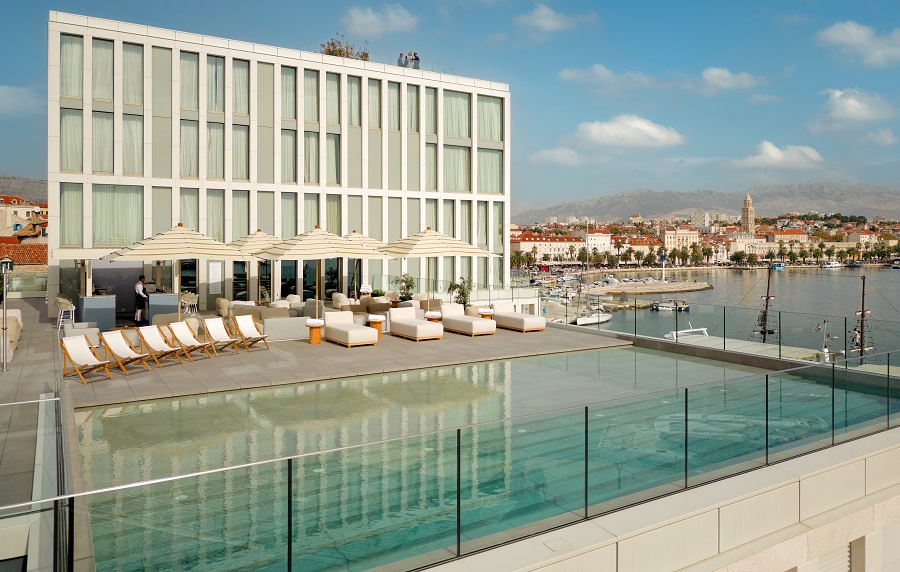
The spectacular views continue at the Pool Bar, which is open to hotel guests only. And what a location to while away a lazy afternoon after a morning's sightseeing.
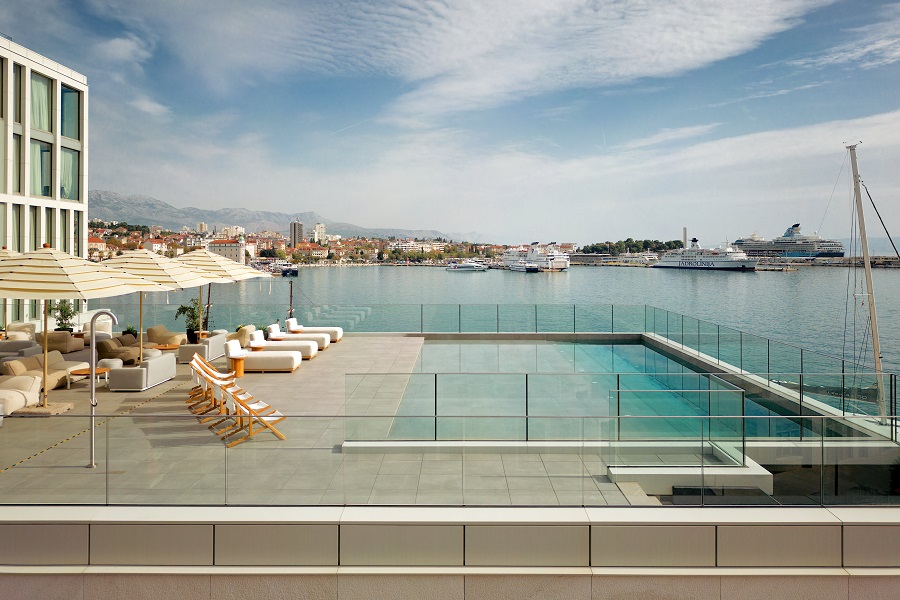
Health snacks, salads and drinks are served, with towels available - a perfect spot to follow the pace of life in Split's famous harbour.
Looking for a view that is EVEN more spectacular and offering a lot more privacy? The top terrace has the best views of all and will soon be available for private hire, so if you are planning on a unique dinner to impress friends or business partners, look no further.
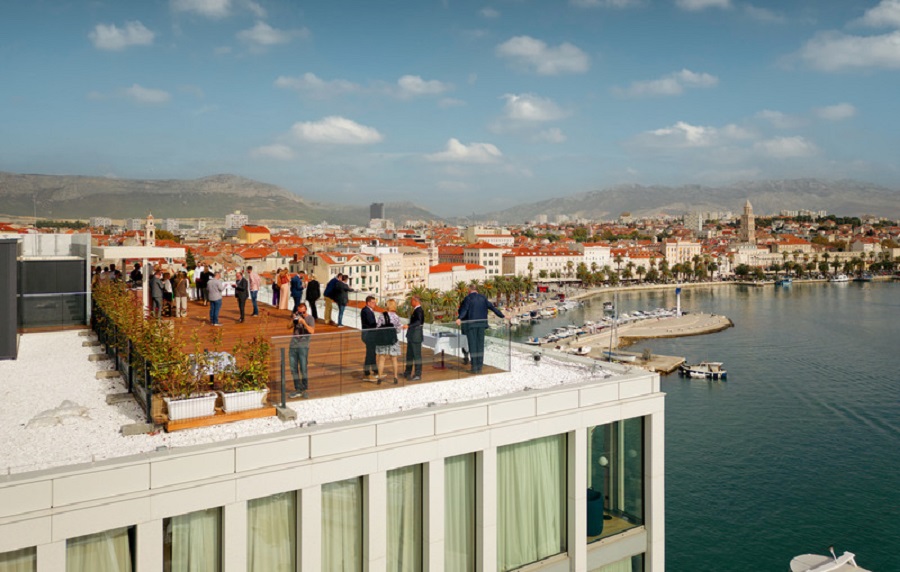
Bar Split, just off reception, and its accompanying terrace, is a fine addition to the Split scene, and an excellent new address for those looking to take their daily coffee while overlooking life on the Adriatic.
Open to non-residents, Bar Split's terrace is an excellent way to sample the atmosphere of the hotel for locals, while enjoying a different view of the Dalmatian capital. And if you are looking for something a little stronger, check out the signature cocktails on offer.
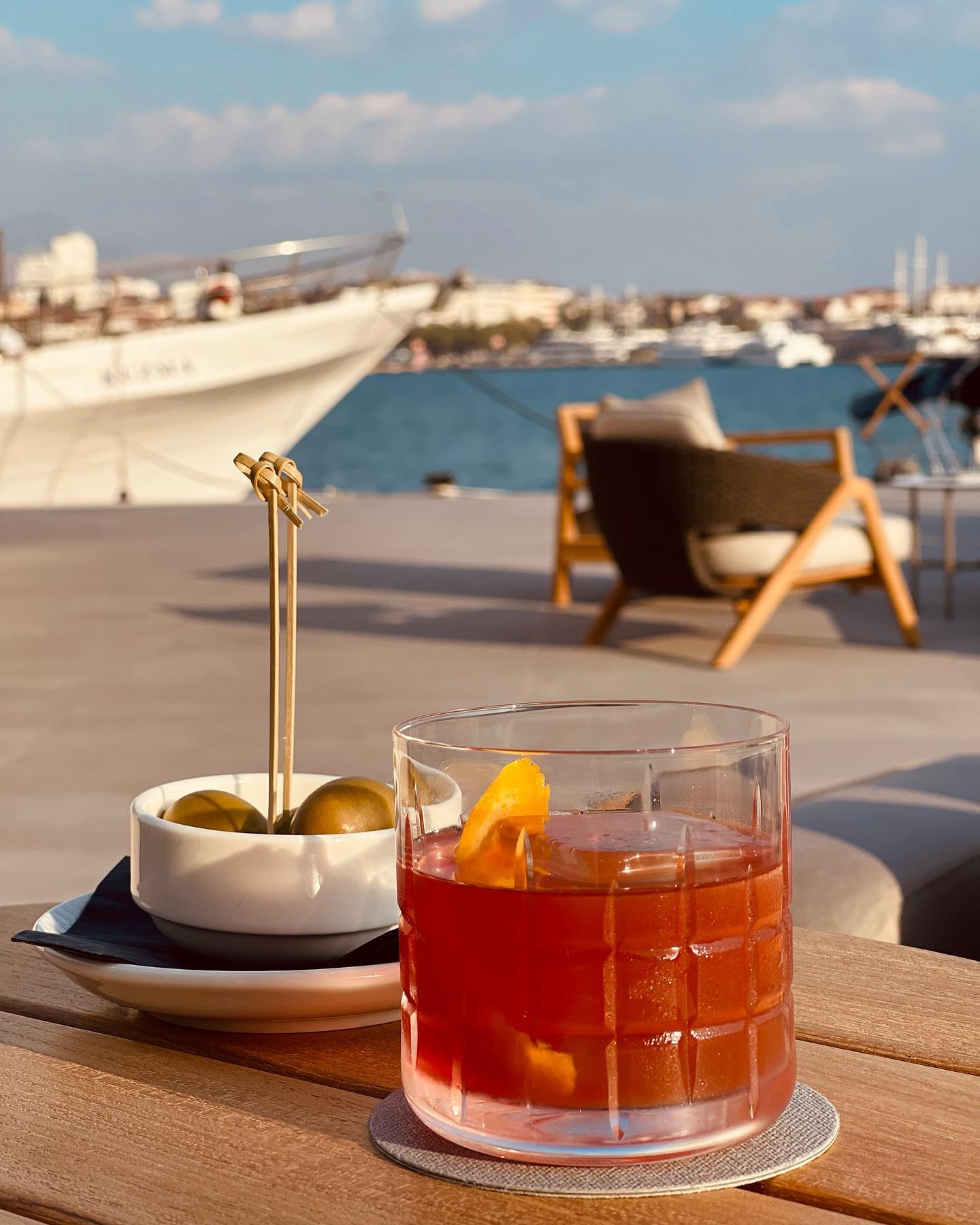
Relaxation comes in many forms, and after lounging at the Pool Bar for a while, the Hacelia Spa is waiting to welcome you for a range of massages, saunas and beauty services.
Hacelia Spa also comes with a fully equipped gym. Day passes and monthly memberships are available to non-residents.
Looking for an impressive location to hold a conference or seminar?
Below the main hotel, but with plenty of natural light, is a multi-purpose conference room, away from the buzz of the city, which is ideal for banquets, conferences, and other such events. With a capacity of 100 people maximum, this versatile space offers a range of meeting opportunities - full catering services are available on demand.
One building, one addition to the Split tourism scene, but with quite an offer packed into it.
There are so many aspects of this hotel that I really like, but at the end of the day, one really has to come back to THAT view - what a way to start the day on your next Split vacation.
You can learn more about Hotel Ambasador Split on the official website.
****
Paul Bradbury was a guest of Hotel Ambasador Split in December, 2022.
Croatian Easter Tourism: More Than 940,000 Overnight Stays Recorded
April the 12th, 2023 - Croatian Easter tourism, or more precisely tourism throughout the country so far this month, has been excellent and by far outdone the numbers which were recorded back during the pre-pandemic, record year of 2019.
As Poslovni Dnevnik writes, although Easter fell earlier this year than last year and earlier than the one back during the record-breaking year of 2019, according to some figures, Croatian Easter tourism attracted more guests compared to last year. This is a more than promising sign for the upcoming summer season.
According to e-Visitor data, in the current part of April, more specifically up until Easter Monday in Croatia, there were around 300,000 arrivals and more than 940,000 overnight stays recorded, which, when compared to the same period of April last year, represents growth of 55% in arrivals and 73% in overnight stays. When compared to the figures recorded back in April 2019, the aforementioned represents growth of 27% in arrivals and a very encouraging 54% in overnight stays.
At the same time, the most overnight stays were realised in Istria, Kvarner and in Split-Dalmatia County, and in terms of destinations - Dubrovnik, Porec, Rovinj, Zagreb and Split all did very well indeed. The top markets in terms of overnight stays are all European ones - Germany, Austria, Croatia, Italy, the United Kingdom and Slovenia.
The company Awaze, which includes three leading domestic agencies for renting luxury accommodation (Croatia Luxury Rent, My Istria and Istria Home), reported that during the Easter holidays there was a 7% increase in the number of visitors compared to their record Croatian Easter tourism year of 2022. At the same time, current sales results indicate that the total number of sold reservations stands at 32% more than compared to the first quarter of last year.
"This is excellent, although, of course, earnings and profits are more important to us than physical arrivals, and that's why we have to focus on quality and thus earn the maximum with a sustainable number of guests, while at the same time using our physical resources as little as possible,'' commented Veljko Ostojic, the director of the Croatian Tourism Association.


